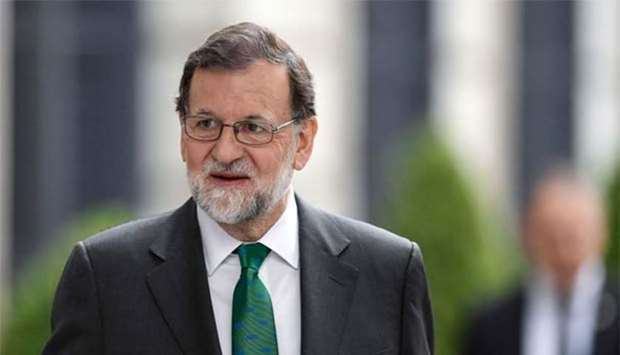Spain's parliament on Thursday began debating a no-confidence motion against Prime Minister Mariano Rajoy following a court ruling in a major corruption case involving his ruling conservative Popular Party (PP).
The parliamentary vote seeking Rajoy's ouster was filed by the main opposition Socialists, who say he has lost credibility after last week's exposure in court of a vast system of bribes given to former PP officials in exchange for lucrative public contracts.Lawmakers are due to vote on the motion on Friday.
Analysts say the Socialists are within striking distance of cobbling together an absolute majority of 176 lawmakers needed to force out Rajoy, who leads a minority government after being reelected in 2016.
If the motion succeeds, the Socialists have pledged to call a fresh election within months.
Last Thursday, the Madrid-based National Court, which deals with major criminal cases, announced that it had handed jail terms to 29 people with links to the PP, ordering the party to pay back 245,000 euros ($290,000) received through the scheme to fund elections.
Known as the so-called Gurtel affair, the scheme operated between 1999 and 2005. The court also confirmed the existence of a party "slush fund" which had been running for decades.
"Now we know the verdict in the Gurtel case, there are no more suspicions, only certainties: that Gurtel was the PP and the PP was Gurtel," top Socialist official Jose Luis Abalos told parliament as he opened the debate.
The Socialists, who hold 84 of the parliament's 350 seats, have won backing for the motion from anti-establishment party Podemos, which holds 67 mandates.
And with the support of Catalonia's two main separatist parties, it could pull together 175 votes -- just one short of the 176 needed to pass the motion.
All eyes are now on the Basque Nationalist Party (PNV) and its five lawmakers.
The party, which helped Rajoy pass his 2018 budget earlier this month, has said it will decide its position after hearing Socialist leader Pedro Sanchez speak in parliament on Thursday.
"Spain, in the hands of the PNV," read the headline of the ABC and El Mundo dailies.
Rajoy has denied any knowledge of a party slush fund. During a debate in parliament on Wednesday, he said he intended to serve out his four-year term which ends in 2020.
The court ruling is the latest in a string of graft scandals touching the PP. In its defence, the party has argued only a tiny number of its politicians have been tained by corruption and that it is tackling the problem.

